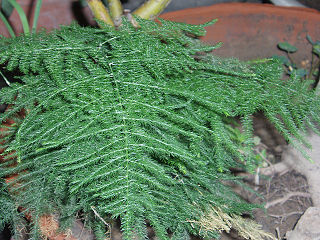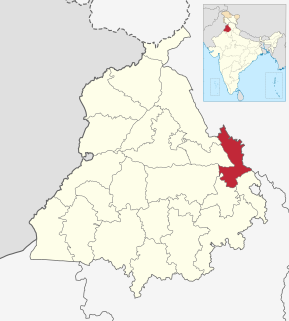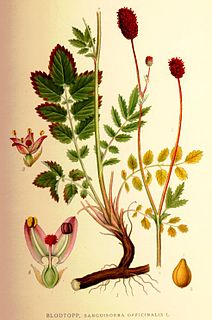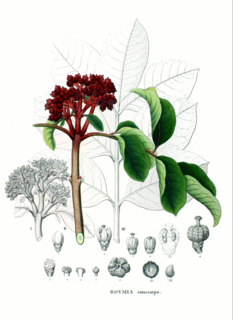
Traditional Chinese medicine (TCM) is an alternative medical practice drawn from traditional medicine in China. It has been described as "fraught with pseudoscience", and the majority of its treatments as having no logical mechanism of action.

Salvia rosmarinus, commonly known as rosemary, is a shrub with fragrant, evergreen, needle-like leaves and white, pink, purple, or blue flowers, native to the Mediterranean region. Until 2017, it was known by the scientific name Rosmarinus officinalis, now a synonym.

Calendula is a genus of about 15–20 species of annual and perennial herbaceous plants in the daisy family Asteraceae that are often known as marigolds. They are native to southwestern Asia, western Europe, Macaronesia, and the Mediterranean..
The Vinaya is the division of the Buddhist canon (Tripitaka) containing the rules and procedures that govern the Buddhist monastic community, or Sangha. Three parallel Vinaya traditions remain in use by modern monastic communities: the Theravada, Mulasarvastivada and Dharmaguptaka. In addition to these Vinaya traditions, Vinaya texts of several extinct schools of Indian Buddhism are preserved in the Tibetan and East Asian canons, including those of the Kāśyapīya, the Mahāsāṃghika, the Mahīśāsaka, and the Sarvāstivāda

Asparagus is a genus of flowering plants in the family Asparagaceae, subfamily Asparagoideae. It comprises up to 300 species. Most are evergreen long-lived perennial plants growing from the understory as lianas, bushes or climbing plants. The best-known species is the edible Asparagus officinalis, commonly referred to as just asparagus. Some other members of the genus, such as Asparagus densiflorus, are grown as ornamental plants.

Borage, also known as a starflower, is an annual herb in the flowering plant family Boraginaceae. It is native to the Mediterranean region, and has naturalized in many other locales.

Morinda citrifolia is a fruit-bearing tree in the coffee family, Rubiaceae. Its native range extends across Southeast Asia and Australasia, and was spread across the Pacific by Polynesian sailors. The species is now cultivated throughout the tropics and widely naturalized. Among some 100 names for the fruit across different regions are the more common English names of great morinda, Indian mulberry, noni, beach mulberry, and cheese fruit.

Morinda is a genus of flowering plants in the madder family, Rubiaceae. The generic name is derived from the Latin words morus "mulberry", from the appearance of the fruits, and indica, meaning "of India".
A number of ethnic groups of the People's Republic of China are not officially recognized. Taken together, these groups would constitute the twentieth most populous ethnic group of China. Some scholars have estimated that there are over 200 distinct ethnic groups that inhabit China, compared to 56 groups are officially recognized. There are in addition small distinct ethnic groups that have been classified as part of larger ethnic groups that are officially recognized. Some groups, like the Hui of Xinjiang with the Hui of Fujian, are geographically and culturally separate, except for the shared belief of Islam. Han Chinese, being the world's largest ethnic group, has a large diversity within it, such as in Gansu, whose Han individuals may have genetic traits from the assimilated Tangut civilization. Although they are indigenous to Hainan island and do not speak a Chinese language, the Limgao (Ong-Be) people near the capital are counted as Han Chinese.

Morinda is a multi-level marketing company based in American Fork, Utah that sells Tahitian Noni juice and other products made from the noni plant. The company was founded in 1996 and has manufacturing facilities in Tahiti, Japan, China, Germany, and Utah. Morinda, formerly known as Tahitian Noni International and Morinda Bioactives, was a subsidiary of Morinda Holdings, Inc. prior to merging with and becoming a wholly owned subsidiary of New Age Beverages Corporation in December 2019.

Melissa is a genus of perennial herbs in the Lamiaceae, native to Europe and Asia but cultivated and naturalized in many other places. The name Melissa is derived from the Greek word μέλισσα (mélissa) meaning "honeybee", owing to the abundance of nectar in the flowers. The stems are square, like most other plants in the mint family. The leaves are borne in opposite pairs on the stems, and are usually ovate or heart-shaped and emit a lemony scent when bruised. Axillary spikes of white or yellowish flowers appear in the summer.

Rupnagar district is one of twenty-two districts in the state of Punjab, India. The town of Rupnagar is said to have been founded by a Raja called Rokeshar, who ruled during the 11th century and named it after his son Rup Sen. It is also the site of an ancient town of the Indus Valley Civilization. The major cities in Rupnagar District are Morinda, Nangal and Anandpur Sahib. Morinda is also known as Baghwāla "[The City] of Gardens." Morinda is located on the Chandigarh-Ludhiana Highway. The Bhakra Dam in Nangal lies on the boundary with the neighboring state of Himachal Pradesh. Dadhi is one of the most important villages of the district, particularly because of Gurudwara Sri Hargobindsar Sahib.

Sanguisorba officinalis, commonly known as great burnet, is a plant in the family Rosaceae, subfamily Rosoideae. It is native throughout the cooler regions of the Northern Hemisphere in Europe, northern Asia, and northern North America.

Morinda is a city with Municipal Council in Rupnagar District in the Indian state of Punjab. Morinda is an old town which is believed to trace its name from Mor Jats.it can be known as Moran and then Morinda.

Calendula officinalis, the pot marigold, common marigold, ruddles or Scotch marigold, is a flowering plant in the daisy family Asteraceae. It is probably native to southern Europe, though its long history of cultivation makes its precise origin unknown, and it may possibly be of garden origin. It is also widely naturalised farther north in Europe and elsewhere in warm temperate regions of the world.

Officinalis, or officinale, is a Medieval Latin epithet denoting organisms — mainly plants — with uses in medicine, herbalism and cookery. It commonly occurs as a specific epithet - the second term of a two-part botanical name. Officinalis is used to modify masculine and feminine nouns, while officinale is used for neuter nouns.

Cornus officinalis, the Japanese cornel or Japanese cornelian cherry, is a species of flowering plant in the dogwood family Cornaceae. Despite its name, it is native to China and Korea as well as Japan. It is not to be confused with C. mas, which is also known as the Cornelian cherry. It is not closely related to the true cherries of the genus Prunus.

Shuanghua is a town under the jurisdiction of Wuhua County, Meizhou City, Guangdong Province, southern China.

Tetradium ruticarpum is a tree that comes from China and Korea. It was previously classified in the genus Euodia as Euodia ruticarpa. The fruit is usually used, denoted sometimes as fructus. It has a strong bitter taste, and is used in traditional Chinese medicine (TCM) and is a recognized herb in Kampo. Both the former genus name and the species name are often misspelled, and the plant usually appears in sources dealing with traditional Chinese medicine as "Evodia(e) rutaecarpa".
Nan Bao (男宝) is a formula of Chinese herbs purported to increase the male libido. It is available from a variety of suppliers in similar formulations.

















